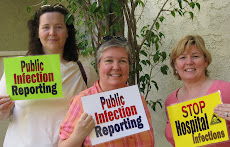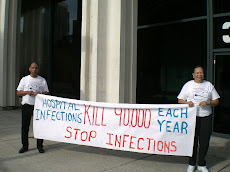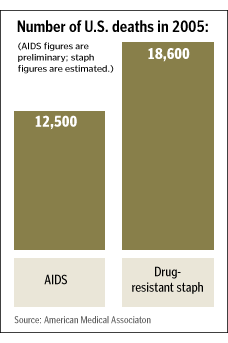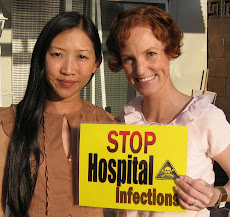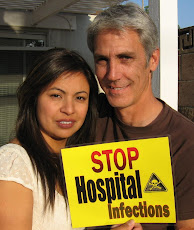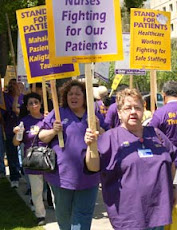On Wed, Mar 12, 2008 at 12:23 AM, Hugh M. Robert <hugh.robert@gmail.com> wrote:
The senate recently voted against a bill that would have mandated health insurance companies to cover medically necessary procedures. While this bill has been politicized, there are some serious procedures that are being denied which are important to the insured’s health.
We are currently looking for examples where an insurance company has denied a claim for a breast reconstruction after chemo and mastectomy surgery, or a case where perhaps a burn victim was denied a claim to have facial reconstruction surgery.
If you could please pass this along to your lists and if you know of someone who has one of these circumstances, please have them contact me as soon as possible.
On Wed, Mar 12, 2008 at 10:06 PM, Hugh M. Robert <hugh.robert@gmail.com> wrote:
We will be having a press conference on Tuesday March 18th at 10:30 AM in the capital press room on the fourth floor to call attention to the problem of nursing homes operating without insurance.
We have one family who will be telling their story of a loved one who was seriously injured and not able to pursue a case due to the nursing home being in receivership.
We would love to have a couple more families or stories to tell at our press conference. If you know someone or could pass this along to your list to ask for families who have had a loved one injured but not able to hold them responsible due to their not carrying insurance, please have them contact me ASAP.
Hugh M. Robert
Executive Director
OK Center for Consumer and Patient Safety
PO Box 4481
Tulsa, OK 74159
office: 800-994-6025
mobile: 918-850-0293
facsimile 918-512-4208
hugh@okccps.org
Thursday, March 13, 2008
'Dr. Death' arrested in Oregon
FBI arrests doctor wanted in Australia
By WILLIAM McCALL
Wed., March. 12, 2008
PORTLAND, Ore. - First New York, then Oregon, and now Australia. Dr. Jayant Patel is accused of leaving a bloody trail of mistakes as a surgeon, now resulting in manslaughter charges.
His arrest at his Portland home Tuesday morning started the legal clock ticking on an extradition request by Australia, where he was director of surgery at Bundaberg Base Hospital in Queensland from 2003 to 2005.
Patel made a brief appearance Tuesday afternoon in U.S. District Court, where a judge scheduled a hearing for Thursday afternoon. His extradition hearing was set for April 10.
The extradition complaint charges Patel under Australian law with three counts of manslaughter, three counts of grievous bodily harm, two counts of negligent acts or omissions causing harm, seven counts of fraud and one count of attempted fraud.
If convicted on all counts, Patel could face up to three life terms in prison plus 100 years.
The complaint also said Patel "actively hid his history of professional misconduct and lied repeatedly on forms required for registration in Australia."
In a separate memo filed by the U.S. Attorney's office in Portland, prosecutors said that once he was hired in Australia, "Patel bungled surgeries with tragic results."
The list included: failure to stop internal bleeding in one patient who later died; removing a healthy gland from one patient and leaving behind a cancerous gland; tearing one patient's esophagus; and performing unnecessary surgery on patients in poor health when there were less risky alternatives.
Patel told U.S. Magistrate Judge Dennis Hubel "most likely not" when asked whether he could afford an attorney, so he was represented by a federal public defender, Susan Russell.
A family friend, Dr. Vijay Mehta, a Texas surgeon, compared a trial for Patel in Australia to Osama bin Laden going on trial in the United States.
"His wife has told me the best chance he has got is to fight extradition because they are not sure that they can even expect a fair trial in Australia with all the publicity and the demonizing," Mehta told Australian Broadcasting Corp. Radio.
Russell told the judge that Patel, who was born in India, came to the United States in 1977 and became a naturalized citizen in 1982.
News of the arrest was welcomed in Australia, where an organizer of a Bundaberg Hospital patient support group immediately phoned former Patel patients to inform them after first hearing the news in the middle of the night.
"We made a pact that they were to be told and they were very excited and relieved," Beryl Crosby said.
Patel was welcomed at first at the hospital in Bundaberg, a town of about 50,000 on the east coast of Australia known for sugar cane and as the tourism gateway to the Great Barrier Reef.
But then things began to go wrong for the American-trained surgeon.
Despite glowing references from fellow doctors in Oregon, complaints were emerging in Australia about his professionalism, his standard of patient care and even his personal hygiene. At one point, some nurses at Bundaberg claimed they hid patients from him.
Toni Hoffman, a nurse who worked with Patel at Bundaberg, said he regularly failed to wash his hands between patients, and another nurse, Gail Aylmer, an infection control specialist at the hospital, said he once claimed "doctors' hands don't have germs."
He treated more than 1,200 patients during two years in Australia. He was charged with manslaughter and grievous bodily harm after a government inquiry concluded in 2006 that he may have contributed directly to 13 deaths due to an "unacceptable level of care."
Patel trained in New York state at the University of Rochester School of Medicine in the 1980s, where he was cited for failure to examine some patients before operating on them _ a failure that "clearly evidenced his moral unfitness to practice medicine," according to the New York Commissioner of Health at the time.
However, after a three-year disciplinary probation, Patel was hired in 1989 by Kaiser Permanente Hospital in Portland.
By 1998, he had been sued several times and the Portland hospital had severely restricted his practice after reviewing 79 complaints. Patel left the hospital in 2001 after the Oregon Board of Medical Examiners cited him for "gross or repeated acts of negligence" and extended the restrictions on his practice statewide.
By WILLIAM McCALL
Wed., March. 12, 2008
PORTLAND, Ore. - First New York, then Oregon, and now Australia. Dr. Jayant Patel is accused of leaving a bloody trail of mistakes as a surgeon, now resulting in manslaughter charges.
His arrest at his Portland home Tuesday morning started the legal clock ticking on an extradition request by Australia, where he was director of surgery at Bundaberg Base Hospital in Queensland from 2003 to 2005.
Patel made a brief appearance Tuesday afternoon in U.S. District Court, where a judge scheduled a hearing for Thursday afternoon. His extradition hearing was set for April 10.
The extradition complaint charges Patel under Australian law with three counts of manslaughter, three counts of grievous bodily harm, two counts of negligent acts or omissions causing harm, seven counts of fraud and one count of attempted fraud.
If convicted on all counts, Patel could face up to three life terms in prison plus 100 years.
The complaint also said Patel "actively hid his history of professional misconduct and lied repeatedly on forms required for registration in Australia."
In a separate memo filed by the U.S. Attorney's office in Portland, prosecutors said that once he was hired in Australia, "Patel bungled surgeries with tragic results."
The list included: failure to stop internal bleeding in one patient who later died; removing a healthy gland from one patient and leaving behind a cancerous gland; tearing one patient's esophagus; and performing unnecessary surgery on patients in poor health when there were less risky alternatives.
Patel told U.S. Magistrate Judge Dennis Hubel "most likely not" when asked whether he could afford an attorney, so he was represented by a federal public defender, Susan Russell.
A family friend, Dr. Vijay Mehta, a Texas surgeon, compared a trial for Patel in Australia to Osama bin Laden going on trial in the United States.
"His wife has told me the best chance he has got is to fight extradition because they are not sure that they can even expect a fair trial in Australia with all the publicity and the demonizing," Mehta told Australian Broadcasting Corp. Radio.
Russell told the judge that Patel, who was born in India, came to the United States in 1977 and became a naturalized citizen in 1982.
News of the arrest was welcomed in Australia, where an organizer of a Bundaberg Hospital patient support group immediately phoned former Patel patients to inform them after first hearing the news in the middle of the night.
"We made a pact that they were to be told and they were very excited and relieved," Beryl Crosby said.
Patel was welcomed at first at the hospital in Bundaberg, a town of about 50,000 on the east coast of Australia known for sugar cane and as the tourism gateway to the Great Barrier Reef.
But then things began to go wrong for the American-trained surgeon.
Despite glowing references from fellow doctors in Oregon, complaints were emerging in Australia about his professionalism, his standard of patient care and even his personal hygiene. At one point, some nurses at Bundaberg claimed they hid patients from him.
Toni Hoffman, a nurse who worked with Patel at Bundaberg, said he regularly failed to wash his hands between patients, and another nurse, Gail Aylmer, an infection control specialist at the hospital, said he once claimed "doctors' hands don't have germs."
He treated more than 1,200 patients during two years in Australia. He was charged with manslaughter and grievous bodily harm after a government inquiry concluded in 2006 that he may have contributed directly to 13 deaths due to an "unacceptable level of care."
Patel trained in New York state at the University of Rochester School of Medicine in the 1980s, where he was cited for failure to examine some patients before operating on them _ a failure that "clearly evidenced his moral unfitness to practice medicine," according to the New York Commissioner of Health at the time.
However, after a three-year disciplinary probation, Patel was hired in 1989 by Kaiser Permanente Hospital in Portland.
By 1998, he had been sued several times and the Portland hospital had severely restricted his practice after reviewing 79 complaints. Patel left the hospital in 2001 after the Oregon Board of Medical Examiners cited him for "gross or repeated acts of negligence" and extended the restrictions on his practice statewide.
It's a start but the list is incomplete...
I really wish this Medicare ruling had included Hospital Acquired Infections (HAIs) such as in my case Necrotizing Fasciitis or Man-eating flesh disease. In a case where a patient is in above average health with no prexisting conditions and gets a nosocomial infection following a routine procedure, there should be no charge as well. My hospital made a fabulous profit from the two months I was fighting for my life in their facility.
MSN Money The Basics March 7, 2008
Hospitals won't get to bill for errors
As of October, Medicare will no longer cover treatment resulting from eight types of mistakes, and patients won't have to pay. States and private insurers are also pushing for change.
By Melinda Fulmer
Under pressure from large private insurers, state governments and Medicare, hospitals around the country are now agreeing not to charge when they make medical mistakes, also called "never events" because they shouldn't happen.
Though it may sound like a no-brainer not to charge patients who had surgery on the wrong body part or were disabled from the wrong medication, in the hospital world it is a revolution.
"Asking hospitals to commit to normal customer-service principles should not be radical, but it is," said Rachel Weissburg of The Leapfrog Group, a nonprofit organization that pushed for the move. "We have a very strange system in the U.S., where you don't pay for quality, you pay for service."
That's beginning to change, experts say. Starting in October, Medicare, which covers 44 million elderly and disabled people, won't pay for treatment resulting from eight types of hospital errors, including surgical objects left in a patient during surgery, patient falls, catheter-caused urinary-tract infections and pressure sores, the most common preventable medical error.
Nor will hospitals be able to bill injured patients for these conditions. So a patient who in the course of treatment for a heart attack incurred pressure sores -- bedsores -- would be billed only for the cardiac treatment.
Next year, several more preventable errors will likely be added to the list, including drug-resistant staph infections and ventilator-associated pneumonia, a Medicare spokesperson said. The move is expected to save the government $190 million over five years.
The heat is on The movement to get hospitals to clean up their acts has been building since 2005, when pioneering insurance provider HealthPartners of Minnesota first said it would not pay for hospital errors, Weissburg said.
The next year, The Leapfrog Group took it a step further, pressing hospitals to tear up bills for medical mistakes, report them, apologize to the patients affected and launch investigations into their causes. So far, a little more than half of the 1,300 hospitals it surveys for quality and safety have agreed to this policy.
Under this kind of pressure, state hospital associations and the American Hospital Association are now urging their members to voluntarily agree not to charge for a list of 28 so-called never events published by the National Quality Forum.
Washington Gov. Christine Gregoire recently announced that three state medical groups, including the Washington State Hospital Association, had agreed not to charge for serious medical errors. That came on the heels of action in Vermont and Minnesota, Weissburg said.
This 13-inch-long surgical retractor was left in the body of Donald Church, of Lynnwood, Wash., by a University of Washington Medical Center surgeon during an operation to remove a tumor in June 2000.
Reinforcing these voluntary arrangements is a new resolve among the insurers and agencies that pay the bills. Medicare isn't the only one putting away the checkbook.
Pennsylvania's Department of Public Welfare said last month that it, too, would stop Medicaid payments for errors, following similar moves by Minnesota and Massachusetts. And large insurers such as Aetna, Blue Cross and Blue Shield are modifying contracts to make hospitals absorb the costs of their own mistakes.
"Fortunately, these events are quite rare," said Dr. Troyen Brennan, Aetna's chief medical officer. "However, it is important to take steps that will increase hospitals' focus on why never events happen, promote shared information and facilitate improved processes that will prevent future events."
There's no nationwide system for tallying medical errors. Only about half of the states require any kind of reporting of medical mistakes, Weissburg said.
In Washington state, for example, 193 never events were reported out of 630,000 admissions.
Mistakes must be acknowledged This move has been slow in coming, analysts say, because it forces hospitals to admit fault, a move that could aid malpractice lawsuits. Los Angeles tort attorney Peter K. Levine said that might be true.
"It's just one more arrow in our quiver," he said. But, he adds, with expert witnesses, serious mistakes generally aren't that difficult to prove in court. And, he said, it may cut down on the number of lawsuits, as more angry patients are mollified.
"Treating the customer right goes a long way to preventing litigation," Levine said.
But will withholding pay really improve care? Hospital groups say it will because it provides an incentive for people to point out imminent mistakes.
Under Washington State Hospital Association guidelines, many of the people in an operating room will not be paid if a mistake happens. So anesthesiologists, nurses and others have more reason to speak up if they see a physician about to make an error, said Cassie Sauer, a spokeswoman for the Washington association.
Of course, these hospital guidelines are voluntary, so there's no guarantee that everyone will follow them.
But, Weissburg said, with insurers, medical groups and Medicare turning up the pressure, hospitals have no choice but to improve their game. "The culture is changing -- it's being forced to change."
What Medicare won't pay for:
An object mistakenly left in a patient during surgery.
A preventable air embolism.
Complications from being given incompatible blood.
Catheter-associated urinary-tract infections.
Pressure ulcers (bedsores).
A vascular catheter-associated infection.
A surgery-site infection after coronary-artery-bypass graft surgery.
Patient falls.
Some hospitals won't charge for these never events:
Surgery on the wrong body part.
Surgery on the wrong patient.
The wrong surgical procedure.
Unintentionally leaving a foreign object inside a patient during surgery.
A postoperative death of a normal, healthy patient.
An infant discharged to the wrong person.
A patient suicide or attempted suicide resulting in serious disability.
A maternal death or serious disability in a low-risk pregnancy.
A death or serious disability (brain damage) associated with jaundice in infants.
Stage 3/4 pressure ulcers (bedsores).
Artificial insemination with the wrong donor sperm or wrong egg.
Any incident in which a line designated for oxygen or other gas to be delivered contains the
wrong gas or toxic substances.
Care ordered by someone impersonating a physician, a nurse, a pharmacist or other licensed health-care provider.
Abduction of a patient.
Sexual assault of a patient.
A death or significant injury of patient or staff from physical assault.
The same hospitals won't charge for a patient death or serious disability:
Caused by contaminated drugs, devices or biologics.
Linked to the use or function of a device other than as intended.
Associated with an intravascular air embolism.
Associated with a patient escaping or leaving without permission.
From a medication error.
Linked to a reaction to incompatible blood or blood products.
Associated with hypoglycemia.
Due to spinal manipulative therapy.
Associated with electric shock.
Associated with a burn incurred while hospitalized.
Associated with a fall.
Linked to the use of restraints.
MSN Money The Basics March 7, 2008
Hospitals won't get to bill for errors
As of October, Medicare will no longer cover treatment resulting from eight types of mistakes, and patients won't have to pay. States and private insurers are also pushing for change.
By Melinda Fulmer
Under pressure from large private insurers, state governments and Medicare, hospitals around the country are now agreeing not to charge when they make medical mistakes, also called "never events" because they shouldn't happen.
Though it may sound like a no-brainer not to charge patients who had surgery on the wrong body part or were disabled from the wrong medication, in the hospital world it is a revolution.
"Asking hospitals to commit to normal customer-service principles should not be radical, but it is," said Rachel Weissburg of The Leapfrog Group, a nonprofit organization that pushed for the move. "We have a very strange system in the U.S., where you don't pay for quality, you pay for service."
That's beginning to change, experts say. Starting in October, Medicare, which covers 44 million elderly and disabled people, won't pay for treatment resulting from eight types of hospital errors, including surgical objects left in a patient during surgery, patient falls, catheter-caused urinary-tract infections and pressure sores, the most common preventable medical error.
Nor will hospitals be able to bill injured patients for these conditions. So a patient who in the course of treatment for a heart attack incurred pressure sores -- bedsores -- would be billed only for the cardiac treatment.
Next year, several more preventable errors will likely be added to the list, including drug-resistant staph infections and ventilator-associated pneumonia, a Medicare spokesperson said. The move is expected to save the government $190 million over five years.
The heat is on The movement to get hospitals to clean up their acts has been building since 2005, when pioneering insurance provider HealthPartners of Minnesota first said it would not pay for hospital errors, Weissburg said.
The next year, The Leapfrog Group took it a step further, pressing hospitals to tear up bills for medical mistakes, report them, apologize to the patients affected and launch investigations into their causes. So far, a little more than half of the 1,300 hospitals it surveys for quality and safety have agreed to this policy.
Under this kind of pressure, state hospital associations and the American Hospital Association are now urging their members to voluntarily agree not to charge for a list of 28 so-called never events published by the National Quality Forum.
Washington Gov. Christine Gregoire recently announced that three state medical groups, including the Washington State Hospital Association, had agreed not to charge for serious medical errors. That came on the heels of action in Vermont and Minnesota, Weissburg said.
This 13-inch-long surgical retractor was left in the body of Donald Church, of Lynnwood, Wash., by a University of Washington Medical Center surgeon during an operation to remove a tumor in June 2000.
Reinforcing these voluntary arrangements is a new resolve among the insurers and agencies that pay the bills. Medicare isn't the only one putting away the checkbook.
Pennsylvania's Department of Public Welfare said last month that it, too, would stop Medicaid payments for errors, following similar moves by Minnesota and Massachusetts. And large insurers such as Aetna, Blue Cross and Blue Shield are modifying contracts to make hospitals absorb the costs of their own mistakes.
"Fortunately, these events are quite rare," said Dr. Troyen Brennan, Aetna's chief medical officer. "However, it is important to take steps that will increase hospitals' focus on why never events happen, promote shared information and facilitate improved processes that will prevent future events."
There's no nationwide system for tallying medical errors. Only about half of the states require any kind of reporting of medical mistakes, Weissburg said.
In Washington state, for example, 193 never events were reported out of 630,000 admissions.
Mistakes must be acknowledged This move has been slow in coming, analysts say, because it forces hospitals to admit fault, a move that could aid malpractice lawsuits. Los Angeles tort attorney Peter K. Levine said that might be true.
"It's just one more arrow in our quiver," he said. But, he adds, with expert witnesses, serious mistakes generally aren't that difficult to prove in court. And, he said, it may cut down on the number of lawsuits, as more angry patients are mollified.
"Treating the customer right goes a long way to preventing litigation," Levine said.
But will withholding pay really improve care? Hospital groups say it will because it provides an incentive for people to point out imminent mistakes.
Under Washington State Hospital Association guidelines, many of the people in an operating room will not be paid if a mistake happens. So anesthesiologists, nurses and others have more reason to speak up if they see a physician about to make an error, said Cassie Sauer, a spokeswoman for the Washington association.
Of course, these hospital guidelines are voluntary, so there's no guarantee that everyone will follow them.
But, Weissburg said, with insurers, medical groups and Medicare turning up the pressure, hospitals have no choice but to improve their game. "The culture is changing -- it's being forced to change."
What Medicare won't pay for:
An object mistakenly left in a patient during surgery.
A preventable air embolism.
Complications from being given incompatible blood.
Catheter-associated urinary-tract infections.
Pressure ulcers (bedsores).
A vascular catheter-associated infection.
A surgery-site infection after coronary-artery-bypass graft surgery.
Patient falls.
Some hospitals won't charge for these never events:
Surgery on the wrong body part.
Surgery on the wrong patient.
The wrong surgical procedure.
Unintentionally leaving a foreign object inside a patient during surgery.
A postoperative death of a normal, healthy patient.
An infant discharged to the wrong person.
A patient suicide or attempted suicide resulting in serious disability.
A maternal death or serious disability in a low-risk pregnancy.
A death or serious disability (brain damage) associated with jaundice in infants.
Stage 3/4 pressure ulcers (bedsores).
Artificial insemination with the wrong donor sperm or wrong egg.
Any incident in which a line designated for oxygen or other gas to be delivered contains the
wrong gas or toxic substances.
Care ordered by someone impersonating a physician, a nurse, a pharmacist or other licensed health-care provider.
Abduction of a patient.
Sexual assault of a patient.
A death or significant injury of patient or staff from physical assault.
The same hospitals won't charge for a patient death or serious disability:
Caused by contaminated drugs, devices or biologics.
Linked to the use or function of a device other than as intended.
Associated with an intravascular air embolism.
Associated with a patient escaping or leaving without permission.
From a medication error.
Linked to a reaction to incompatible blood or blood products.
Associated with hypoglycemia.
Due to spinal manipulative therapy.
Associated with electric shock.
Associated with a burn incurred while hospitalized.
Associated with a fall.
Linked to the use of restraints.
Subscribe to:
Posts (Atom)
